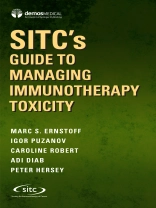The Society for Immunotherapy of Cancer’s handbook, SITC’s Guide to Managing Immunotherapy Toxicity, is a practical reference to managing side effects associated with FDA-approved cancer immunotherapy drugs. Separated into two parts, Part I contains chapter-based overviews of immune checkpoint inhibitors in the clinic, starting with anti-CTLA4 agents, anti-PD1/PD-L1 agents, and approved immunotherapeutic combinations. These chapters cover relevant mechanisms of action, indications, and toxicities seen while combating early, advanced, and metastatic stages in cancer patients. Part II is structured by common and uncommon toxicities that affect major organ sites throughout the body. It begins with a general summary of principles and management options followed by chapters focusing on specific toxicities such as rash and mucosal irritation, muscle and joint toxicity, diarrhea and colitis, pneumonitis, endocrine toxicities, neurological toxicities, cardiac toxicity, renal toxicity, hematologic toxicity, and ocular toxicities. Each chapter provides guidance on how to assess and treat the toxicity and how to support the patient through acute and chronic effects with detailed summary tables for quick reference. Part II concludes with chapters covering management of special patient populations, including patients with autoimmune disease and geriatric patients, treatment and management of fatigue, and a final chapter dedicated to cost effectiveness and the toll of financial toxicity on patients and caregivers.
With chapters written by world-recognized leaders in the immuno-oncology field, this text provides thorough coverage of the toxicity and management of adverse effects for immune checkpoint inhibitors. It is an indispensable resource for clinical oncologists, emergency physicians, hospitalists and other medical practitioners in both the hospital and community clinic settings, especially as the use of immune checkpoint inhibitors becomes a fixture in oncology care.
Key Features:
- Outlines strategies for treating high-risk patients facing an acute or chronic side effect to immunotherapy
- Provides numerous tables that condense and highlight pertinent information for quick reference
- Describes the various clinical presentations and toxic reactions caused by immunotherapy
- Purchase includes access to the e Book for use on most mobile devices or computer
विषयसूची
Foreword
Introduction
Part 1: Immune Checkpoint Inhibitors in the Clinic
Chapter One: Overview of Anti-CTLA-4 Agents: Ipilimumab and Tremilimumab
Chapter Two: Overview of PD-1 and PD-L1 Inhibitors
Chapter Three: Indications and Toxicities of Immune Checkpoint Inhibitor Combinations
Part 2: Specific Immune Checkpoint Inhibitor Toxicities
Chapter Four: General Principles of Immune-Related Toxicities
Chapter Five: Dermatological Toxicities: Rash, Mucosal Irritation, and Pruritus
Chapter Six: Musculoskeletal and Rheumatologic Toxicities
Chapter Seven: Immune-Related Gastrointestinal Toxicities
Chapter Eight: Pneumotoxicity Associated with Immune Checkpoint Blockades
Chapter Nine: Immune-Related Endocrinopathies Associated with Immune Checkpoint Inhibitors
Chapter Ten: Neurologic Adverse Events and Neurologic Complications
Chapter Eleven: Cardiovascular Toxicities Related to Immune Checkpoint Inhibitors
Chapter Twelve: Renal Toxicities Associated with Immune Checkpoint Inhibitors
Chapter Thirteen: Hematologic Toxicities of Apparent Immune-Related Origins
Chapter Fourteen: Ocular Toxicities Caused by Immune Dysregulation
Chapter Fifteen: Safety and Regulation of Immune Checkpoint Inhibitors in Special Patient Populations
Chapter Sixteen: Cancer-Related Fatigue in Patients of Immune Checkpoint Inhibitor Therapy
Chapter Seventeen: Cost Effectiveness and Financial Toxicity in New Cancer Therapies












